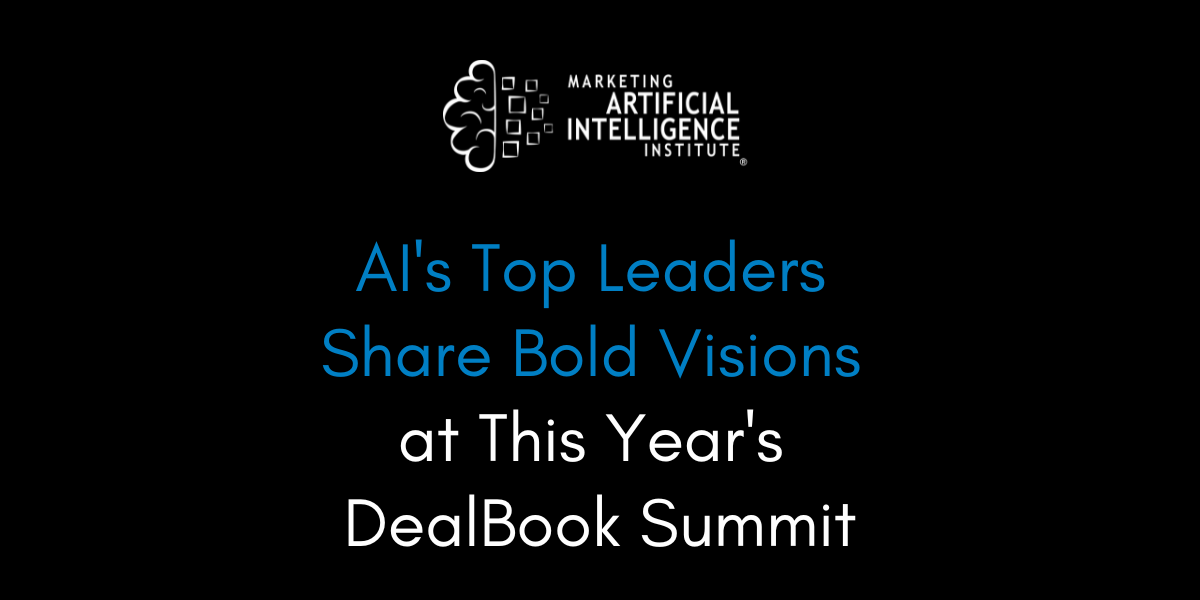Three of tech's most influential leaders just shared their visions for AI's future at The New York Times DealBook Summit. And their message was clear:
AI is advancing faster than most people think—but its impact might look different than we expect.
The annual DealBook Summit, hosted by New York Times columnist Andrew Ross Sorkin, brought together OpenAI CEO Sam Altman, Google CEO Sundar Pichai, and Amazon founder Jeff Bezos for a series of candid conversations about AI's trajectory.
What are the most important takeaways from these conversations?
I got the scoop from Marketing AI Institute founder and CEO Paul Roetzer on Episode 126 of The Artificial Intelligence Show.
The Numbers Behind ChatGPT’s Growth
Out of the gate, Altman shared some never-before-seen stats on ChatGPT’s incredible growth.
He said that ChatgGPT now has 300 million weekly active users and that users send 1 billion messages on ChatGPT every single day. Not to mention, the platform now has 1.3 million developers building on it in the US alone.
And that’s just 2 years after ChatGPT’s release on November 30, 2022.
AGI: Not If, But When—And So What?
Altman also made waves with his assessment of artificial general intelligence (AGI), suggesting we'll reach it sooner than most expect—but with an interesting twist.
"My guess is we will hit AGI sooner than most people in the world think, and it will matter much less," Altman said. He said he believes AGI will lead to massive economic progress and innovation, and that we’ll move on with our lives as that happens. He did indicate there could be economic disruption along the way though, saying the disruption from AI may take longer than people think, but be more intense than people think.
Overall, this reflects a shifting perspective on AGI within the industry.
"They're very much now talking about AGI as almost like this continuous thing, like a mile marker not the milestone goal anymore," says Roetzer.
Have We Hit a Wall?
All three leaders pushed back against the idea of hitting a "scaling wall" in AI development.
According to Roetzer, they see three main components to building these models:
- Computing power (NVIDIA chips)
- Data (including synthetic data)
- Algorithms for more efficient processing
Altman blatantly says there is no wall to scaling AI. Pichai said that technical breakthroughs will be needed to advance AI, but that these are coming. And Bezos said we’re going to see AI literally everywhere in the coming years—in every single application we can think of.\
Google's Defense and the Search Wars
Google’s Sundar Pichai was confronted immediately by Sorkin with a quote from Microsoft CEO Satya Nadella. In it, Nadella wondered why Google hadn’t established dominance in AI, given the company’s early leadership in the space.
"There was an edge in his voice” when he responded to the question, Roetzer says of Pichai. He then went on to say:
“I would love to do a side by side comparison of Microsoft's own models and our models any day, any time.”
It was a terse response that also alluded to the fact Microsoft, while they are building their own models, is largely reliant right now on OpenAI’s technology.
He also defended Google’s search business model in the face of AI, saying that AI was becoming an integral part of search and, while search would be changing “profoundly,” he expected it to become even better and even more important thanks to AI.
Bezos's Return to AI
Perhaps most surprisingly, Bezos revealed during his interview that he's essentially moonlighting back at Amazon, with 95% of his work focusing on AI initiatives.
"It was really cool to hear," says Roetzer. "Just the fact that this is so significant that these people have moved on from these companies they founded 20 plus years ago are now back almost full time working on AI."
The Takeaway for Businesses
In addition to the details we learned about each leader and their company during these interviews, there’s an overall takeaway here, says Roetzer.
Despite their differences, these leaders all believe in essentially unconstrained AI progress in the years to come. AI will be everywhere, in every tool and product you use to get your job done.
“You can start to think about that in your own business,” he says. “Every piece of software you use is going to have AI in it. Every department in your company is going to have AI in it. Every business in your industry is going to have AI in it. And there’s just going to be smarter versions of everything.”
It’s time to start planning accordingly for that future.
Mike Kaput
As Chief Content Officer, Mike Kaput uses content marketing, marketing strategy, and marketing technology to grow and scale traffic, leads, and revenue for Marketing AI Institute. Mike is the co-author of Marketing Artificial Intelligence: AI, Marketing and the Future of Business (Matt Holt Books, 2022). See Mike's full bio.

